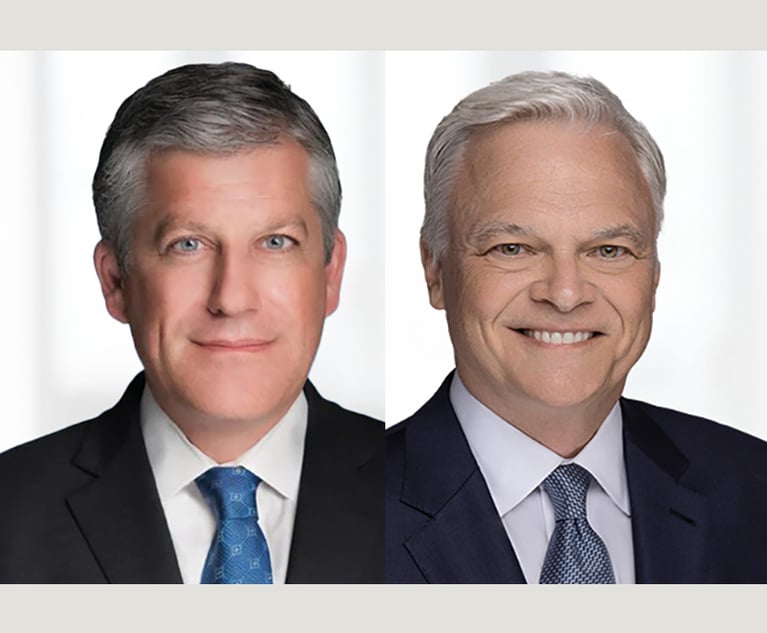Fair Use or Copyright Infringement? You Be the Judge.
The "fair use" defense to copyright infringement is one of the most amorphous legal doctrines. Originating in the U.S. courts, and adopted by only a few other countries, it allows "fair" use of copyrighted works without authorization from the owner.
June 15, 2021 at 10:15 AM
9 minute read
 (L-R)Denisse Garcia Genta and Nicole Galli of ND Galli Law. Courtesy photos
(L-R)Denisse Garcia Genta and Nicole Galli of ND Galli Law. Courtesy photos The "fair use" defense to copyright infringement is one of the most amorphous legal doctrines. Originating in the U.S. courts, and adopted by only a few other countries, it allows "fair" use of copyrighted works without authorization from the owner. The fair use doctrine furthers the constitutional purpose of promoting "the progress of science and useful arts," and has been characterized as fundamental to defending freedom of expression under the First Amendment. But how much and what use is "fair" versus what use will end up being declared copyright infringement often feels like guess work, especially because courts have arrived at different conclusions when faced with the same or very similar fact patterns. This causes some artists, authors and other creators to refrain from borrowing material from an already existing work, which arguably unduly hinders creativity. Recent case law in this area, including from the U.S. Supreme Court, has done little to bring clarity to this already murky area, but some general principles still hold true, which we discuss here.
The test for fair use is a multi-factor test in which all the statutory factors are balanced against each other. Section 107 of the Copyright Act enumerates some types of uses in which fair use is likely to be found such as criticism, comment, news reporting, teaching, scholarship or research. However, this list is not exhaustive and the need to balance all statutory factors means that other purposes have also been found fair in case law.
This content has been archived. It is available through our partners, LexisNexis® and Bloomberg Law.
To view this content, please continue to their sites.
Not a Lexis Subscriber?
Subscribe Now
Not a Bloomberg Law Subscriber?
Subscribe Now
NOT FOR REPRINT
© 2025 ALM Global, LLC, All Rights Reserved. Request academic re-use from www.copyright.com. All other uses, submit a request to [email protected]. For more information visit Asset & Logo Licensing.
You Might Like
View All
'Taking the Best' of Both Firms, Ballard Spahr and Lane Powell Officially Merge
6 minute read

Trending Stories
Who Got The Work
J. Brugh Lower of Gibbons has entered an appearance for industrial equipment supplier Devco Corporation in a pending trademark infringement lawsuit. The suit, accusing the defendant of selling knock-off Graco products, was filed Dec. 18 in New Jersey District Court by Rivkin Radler on behalf of Graco Inc. and Graco Minnesota. The case, assigned to U.S. District Judge Zahid N. Quraishi, is 3:24-cv-11294, Graco Inc. et al v. Devco Corporation.
Who Got The Work
Rebecca Maller-Stein and Kent A. Yalowitz of Arnold & Porter Kaye Scholer have entered their appearances for Hanaco Venture Capital and its executives, Lior Prosor and David Frankel, in a pending securities lawsuit. The action, filed on Dec. 24 in New York Southern District Court by Zell, Aron & Co. on behalf of Goldeneye Advisors, accuses the defendants of negligently and fraudulently managing the plaintiff's $1 million investment. The case, assigned to U.S. District Judge Vernon S. Broderick, is 1:24-cv-09918, Goldeneye Advisors, LLC v. Hanaco Venture Capital, Ltd. et al.
Who Got The Work
Attorneys from A&O Shearman has stepped in as defense counsel for Toronto-Dominion Bank and other defendants in a pending securities class action. The suit, filed Dec. 11 in New York Southern District Court by Bleichmar Fonti & Auld, accuses the defendants of concealing the bank's 'pervasive' deficiencies in regards to its compliance with the Bank Secrecy Act and the quality of its anti-money laundering controls. The case, assigned to U.S. District Judge Arun Subramanian, is 1:24-cv-09445, Gonzalez v. The Toronto-Dominion Bank et al.
Who Got The Work
Crown Castle International, a Pennsylvania company providing shared communications infrastructure, has turned to Luke D. Wolf of Gordon Rees Scully Mansukhani to fend off a pending breach-of-contract lawsuit. The court action, filed Nov. 25 in Michigan Eastern District Court by Hooper Hathaway PC on behalf of The Town Residences LLC, accuses Crown Castle of failing to transfer approximately $30,000 in utility payments from T-Mobile in breach of a roof-top lease and assignment agreement. The case, assigned to U.S. District Judge Susan K. Declercq, is 2:24-cv-13131, The Town Residences LLC v. T-Mobile US, Inc. et al.
Who Got The Work
Wilfred P. Coronato and Daniel M. Schwartz of McCarter & English have stepped in as defense counsel to Electrolux Home Products Inc. in a pending product liability lawsuit. The court action, filed Nov. 26 in New York Eastern District Court by Poulos Lopiccolo PC and Nagel Rice LLP on behalf of David Stern, alleges that the defendant's refrigerators’ drawers and shelving repeatedly break and fall apart within months after purchase. The case, assigned to U.S. District Judge Joan M. Azrack, is 2:24-cv-08204, Stern v. Electrolux Home Products, Inc.
Featured Firms
Law Offices of Gary Martin Hays & Associates, P.C.
(470) 294-1674
Law Offices of Mark E. Salomone
(857) 444-6468
Smith & Hassler
(713) 739-1250






